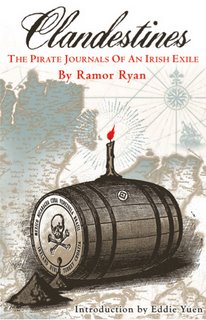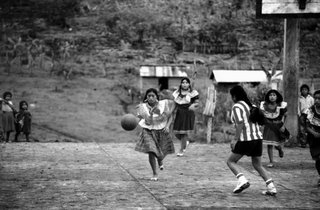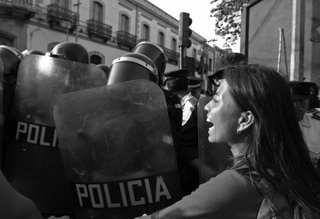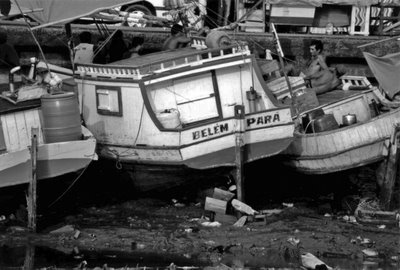 One more push nihilists, if you want to be revolutionaries.Perspectives on Anarchist Theory
One more push nihilists, if you want to be revolutionaries.Perspectives on Anarchist TheoryReviewing:
Days of War, Nights of Love: CrimethInc for Beginners (CrimethInc Workers’ Collective, 2001) and
Days and Nights of Love and War by Eduardo Galeano (New York: Monthly Review Press, 1983).
A STORMY NIGHT….
The wild Pacific Ocean pounds the shore of the tiny Guatemalan port town of Champerico. Overrun by gangs and drugs, Champerico gets one line in the guidebook: sweltering, dilapidated, dangerous—best avoided. My kinda town. Here, among the ghosts of Guatemala’s terrible recent history and the tumultuous daily life of a lawless, desperado town as far removed from shopping mall America as can be imagined, is a good location to begin considering the two books in question.
Galeano’s book is a journal and historical memory of two decades of struggle and perseverance in Latin America, revolving around the pivotal moment of the military coup in Argentina in 1976. CrimethInc’s book is a “cosmology” of radical criticism of contemporary US (and Western European) society that articulates a position of total rebellion toward everyday life. “Are there ways of thinking, acting, and living that may be more satisfying and exciting than the ways we think, act, and live today?”
1 is the question they pose by way of introducing their provocative tract. While Galeano’s book emerges from the New Left, 1968 revolutionary wave, and CrimethInc from the anarchist resurgence of the 1990s, they are linked by their cut and paste aphoristic style, and filled with vignettes, tales and nuggets of revolutionary or radical wisdom. Both embrace philosophy and morality as weapons within a political superstructure.
Champerico evokes the spirit of both books. The fear and terror described in Galeano’s book lingers interminably everywhere in a Guatemala struggling to deal with the aftermath of 30 years of brutal internecine war. And in terms of CrimethInc, here is a place off the global map, a dérive from the usual, a place full of adventures and stories where books could write themselves and one could, in the Situationist sense, take their dreams for reality and really live.
Days and nights of love and war indeed. Strolling along the beach at dusk one evening, I came upon a middle-aged couple in the midst of some appalling drunken melee. The man slapped the woman’s face, dramatically ripped off his clothes and stumbled into the turbulent sea in what appeared to be a quite pathetic attempt to drown himself. The woman screamed and turned to me, hapless bystander, pleading that I rescue the flailing man from the dangerous surf. Somewhat reluctantly, I entered the sea and dragged the inebriated fool to safety. We dragged the naked man by his heels up to a beachside bar; his head left a comical trail in the sand. The woman, who turned out to be the owner of the bar, was apoplectic with gratitude, and furnished me with endless sea food and rum and a bevy of tales about her eclectic life, while Mr Suicide slept off his disgrace.
I remembered the incident as I applied myself to writing this review. CrimethInc implore us to live our lives on the edge, to roam, to discover life by engaging the subterranean springs and discover in the immediate present the revolution of everyday life. In this sense, today’s little adventure—with its component parts of love, conflict, rescue, and resolution—was a moment of engaging life critically, a CrimethInc-esque situation of sorts. This from the section entitled “H is for History:” “If we dare to throw ourselves into the unknown and unpredictable, to continually seek out situations that force us to be in the present moment, we can break free of the feelings of inevitability and inertia that constrain our lives—and in those instants, step outside of history."
2I didn’t feel myself lifted outside of history, but I understand what they are getting at.
But as a prescription for rebellion, is it enough to merely “shake off the dead weight of the past” and “place our selves and our present day existence where they rightfully belong, in the centre of our universe?"
3Here Galeano’s wisdom, born of real struggle, of real days and nights of love and war, is instructive: “Will we be capable of learning humility and patience? I am the world, but very small. A man’s time is not history’s time, although admittedly, we would like it to be."
4STEALING BEAUTY AS RECYCLED SHITOf course, it is unfair to compare CrimethInc’s rag-tag collection of plagiarized ideas with Galeano’s rich testimony to struggle and survival—but they brought it on themselves by inappropriately ripping off his title for their book.
Why do CrimethInc call their book Days of War and Nights of Love? There is no war and scant love (maybe a little teenage infatuation) in this tract. Instead there is boredom with the world they live in, and a quest for something else, an impatient desire to live in a completely different world. Galeano’s beautiful title, which captures well the theme and content of his work and evokes the fine poetic sensibility of his prose, is typically inappropriate for the CrimethInc book. They should have called it something like The ABC of CrimethInc (Anti-) Ideology, a more fitting title for such a pedestrian, navel-gazing tract as this.
The misrepresentation continues with the images adorning the covers—a masked Zapatista and a grenade—suggesting some kind of handbook of guerrilla insurgency. But CrimethInc for Beginners is no guerrilla manifesto. And Galeano’s book is full of tales of masked guerrillas with grenades, but this book is not a handbook of insurgency either. If anything, it is the opposite—a grim chronicle of the follies of armed struggle. Those who resist are not portrayed in the heroic mode, à la Che, but as very ordinary men and women, flawed and weighed down by their inevitable tragic destiny. He spends a few days with some guerrillas in Guatemala: “They were very young…the army was on their tail and they told dirty jokes and roared with laughter… We slept on the ground, hugging one another, bodies glued together for warmth and to keep the early morning freeze from killing us…. Are any of the boys I met back then in the mountains still alive?"
5Galeano talks about real life, real people, real situations, and the psycho-geography of the battlefield of war and love. In the end, it seems like almost all of Galeano’s friends, comrades, acquaintances, and lovers had been disappeared, tortured, exiled, or damaged beyond recognition. Galeano’s achievement is to rescue from this carnage a sense of the dignity and gentle humanity of those who fell, or those who somehow survived. See how he remembers Raúl Sendic, the legendary Tupamaros guerrilla commander—not as a deified heroic martyr, nor cloaked in the sublime mystic of a clandestine revolutionary, but as a kind, humble man: “I close my eyes and again see Raúl in front of the campfire, on the banks of the Río Uruguay. He lifts a live coal to my lips because, bungler that I am, I have let my corn husk cigarette go out again."
6CrimethInc employ the symbols of armed struggle—guns, bullets, grenades, petrol bombs—for no reason other than their spectacular effect, something like the way advertising appropriates sex to sell products: “This book is composed of ideas and images we’ve remorselessly stolen and adjusted for our purposes.…"
7And what purpose would this be? German RAF urban guerrilla Ulrike Mienhof, murdered in Stanheimn prison, is portrayed with these incoherent words pasted over her image: “You will find your only safety is in danger—CrimethInc."
8The mindless desecration of her memory to make a fatuous point reminds me of a joke. What do you get if you cross a situationist with a mafioso? A guy who makes you an offer you can’t understand. And what do you get if cross a CrimethIncer with a situationist? A bad photocopy of a good book.
Text, ideas, and graphics are borrowed and pilfered from the Stoke-Newington fanzine Vague, British graphic artist Clifford Harper, French situationist Raoul Vaneigem and indeed, the whole of the Situationist pantheon. They sack the archives of radical sub-culture to compound a falsehood, the basic premise of this book, that it is an instrument for “total liberation.” In reality, CrimethInc’s vision seldom rises above that of a suburban kid rebelling against authority. Mired in the punk rock and crusty sub-culture, the practical application of all this revolutionary theory is apparently realized by forming a band, fucking in a park, going vegan or—oh my God now we’re really fucking doing it!—giving out phony free tickets to the local cinema.
9 It soon becomes clear that the real crime here is the way they plunder some of the finest and most invigorating ideas from the end of the 20th century, and render them dull and inchoate.
LOVE AND WAR IN THE BELLY OF THE BEASTPossibly the most creative and probably the only original idea in CrimethInc’s book is a blurb on the back cover written by JD Salinger:“If Henry Miller had gone to fight with the anarchists in Spain while Orwell sought the caresses of beautiful women in France, and the
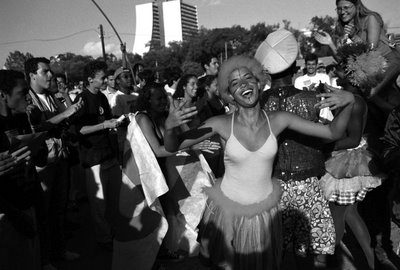
y had collaborated to write a manifesto on war and love, this is the sort of book they might have produced…” However I think that it is Galeano, not CrimethInc, who has produced that sort of book, and it is Days and Nights of Love and War.
Like Orwell, Galeano has taken up arms against fascism, in this case, the Argentinean dictatorship. As he flees for his life, he finds solace in exile in the arms of a variety of extraordinary women from the Tropic of Cancer to the Tropic of Capricorn. For obvious reasons he doesn’t spell out his direct involvement in the armed movements in Argentina and Uruguay, although he does write about a visit to a guerrilla camp in Guatemala and conversations with Cuban veterans in the Sierra Maestro. As he drinks fine wine on summer nights overlooking the River Plate, boozes in back street taverns, or barbecues in the countryside, all his cronies seem to be well known guerrillas on the run, clandestinos or comandantes with a tale or two to tell.
Galeano has been described as the finest Latin American non-fiction writer alive. He employs wonderful lyrical prose that mesmerized readers in his now legendary historical trilogy Memory of Fire with even greater passion here, for now he is chronicling the history not just of his continent, but of his own comrades, friends, family, and lovers. A scathing critique of the Latin American dictatorships is interspersed with intimate vignettes relating the struggle and pain of his compañeros and compañeras. In quiet moments of introspection, his mind moves on philosophical themes—love, death, commitment, betrayal, good wine. The book is a testimony to surviving pain and violence with a capacity for love and tenderness still intact
10—a manifesto of hope despite the times, or dreams undiminished despite the sorrow.
Galeano is at once Orwell in the Spanish trenches facing fascist bullets, and Miller, if not cavorting in lascivious depravity with Parisian whores, at least reveling in the pleasure of nocturnal embraces. Although even here, the shadow of war haunts the joy of sex: “ ...Morning comes and the aroma announces tasty, steamy, freshly made coffee. Your face radiates a clean light and your body smells of love juices.... We count the hours that separate us from the night to come. Then we will make love, the sorrowcide."
11Salinger’s reference to Orwell and Miller in the CrimethInc blurb refers to Orwell’s famous essay, “Inside the Whale” (1940). Orwell reviews Miller’s work and is appalled that the American, although a radical, is concerned solely with the celebration of individual liberation. Miller, we learn, dismisses Orwell’s notion of going to fight fascism in Spain as “sheer stupidity...the act of an idiot."
12Miller chooses the vagabond life of poverty and deprivation as a means of seeking personal salvation, cavorting in the streets and whorehouses of Paris in search of individual liberation while Europe burns. As the threat of Nazism and Fascism loomed over Europe, Miller had removed himself into the safety of the metaphorical belly of a whale, a comfortable space to escape from the storm outside. For Orwell, marching off to the trenches Spain from “a sense of obligation,” Miller’s stance is “the final unsurpassable stage of irresponsibility.” “He is fiddling while Rome is burning,” fumes Orwell, “and unlike the enormous majority of people who do this, fiddling with his face towards the flames."
13While CrimethInc would probably consider themselves a mixture of Miller’s libertarianism and Orwell’s direct action, here they have written a book more akin to Miller’s escapism and individualistic nihilism. They too fiddle while Rome burns. There is no analysis of the macro-political situation; no capitalist globalization, or US hegemony, or imperialism. Even US domestic issues—social control, militarization, the war on drugs, and the prison system—don’t merit a mention. CrimethInc’s anarchism “as a personal approach to life” reflects Miller’s quietism and mysticism. Their quest for individual freedom in the form of squatting, shoplifting, jumping trains, and eating out of garbage cans could be considered a way of living off the belly of the beast, if not inside the whale. As tactics and strategy, these don’t get us very far toward the goal of “total liberation.”
Anticipating this criticism, a CrimethIncer writes: “we have limited ourselves for the most part here to criticism of the established order, because we trust you to do the rest. This book is supposed to help you analyze and disassemble this world—what you build for yourself in its place is in your hands, although we have offered some general ideas of where to start.…"
14And so what does CrimethInc offer?
“F is for Freedom… In the summer of 1999, CrimethInc special agent Tristan Tzarathustra...had eaten only garbage all year as a consequence of his oath not to participate in, add fuel to, or encourage in any way the economy of world capitalism..."
15Oh dear. This guy would make a great naga sadhu, Hindu holy man, stand naked on one leg up a pole for 20 years, tow a freight train with his penis, that kind of thing. Tristan Tzarathustra, crusty holy man.
“H is for Hygiene.” The right to be dirty, etc. “Try violating a few of the ‘common sense’ rules of Western sanitation some time; you’ll find that eating out of garbage cans and going a few weeks without a shower aren’t really as dangerous or difficult as we were taught."
16Try this for fun?! To make a statement? Or as an experiment to feel empathy with the downtrodden? Eating out of garbage cans is not the answer to any thing except spectacular depravity and in terms of CrimethInc’s general strategy, making feral love in a graveyard under the stars is no fun with really smelly people.
“S is for space.... Try exploring in your own neighborhood, looking on rooftops and around corners you never noticed before—you’ll be amazed how much adventure is hidden there waiting for you."
17Endless days of war and nights of love awaiting all you intrepid neighborhood CrimethIncers out there! Don’t get caught!
Having disassembled the world, CrimethInc leaves the rebel outside the system, isolated and alone in personal revolt, further from the general population without the social formation or tools to start building collective projects or the ability to organize concretely. In plagiarizing the Situationist pantheon, they have ignored the most relevant part towards for really changing the world and aspiring towards “total liberation”: “Radical Criticism has merely analysed the Old World and its negation. It must now either realize itself in the practical activity of the revolutionary masses or betray itself by becoming a barrier to that activity."
18DETOURNING ANARCHY"A is for Anarchy... You don’t want to be at the mercy of governments, bureaucracies, police, or other outside forces, do you? Surely you don’t let them dictate your entire life."
19Surely? Firstly, this kind of self-righteous sermonizing sounds a lot better in its original French, and secondly, how can we be, like, anarchists, if you keep telling us how we should be, Reverend CrimethInc?
CrimethInc feel the need to resurrect anarchism “as a personal approach to life.” Here they are borrowing more than an idea, but a historical tendency that they are “adjusting for their own purposes.” “Anarchism is the revolutionary idea that no one is more qualified than you are to decide what your life will be."
20There are many definitions of anarchism, but to reduce the definition to such a purely personal sense is to do it a grave injustice. Anarchism as a historical tendency, as a form of anti-authoritarian community or workers’ self-organization is a concept that CrimethInc throws out the window. Work is the problem for them, not how workers organize. (Maybe workers are the problem for these freewheeling non-workers.)
Movements too are a problem for CrimethInc. This from CrimethInc heavy-hitter Nadia C: “Total revolution will not come merely as a result of proper planning and hard work but out of a leap of faith.... Each of us must be faithful to the yearnings of her heart for things too extravagant to ever fit in this world, and pursue them to such lengths that others are inspired to their own pursuits. It is this alchemy we need, not another movement."
21Apart from the quaint mysticism expressed here, the more perplexing thing is the idea that we don’t need to organize together, or struggle together. It’s enough that we inspire others to their own pursuits. CrimethInc challenge the truism that every anarchist is a socialist, but not every socialist is an anarchist. CrimethInc are not socialists and the question that remains is whether they are indeed anarchists, or merely libertines.
And then there is their irresolute class analysis, stuck in at the end of the C is for Capitalism section entitled “Post script: A Class War everyone can fit in."
22The author argues that there is no class distinction before the misery of modern life, and that rich and poor share the same suffering: “It does not matter if a woman is buried alive in a prison, in a sweat-shop... in a prestigious university, or in a mansion with a private swimming pool, so long as she is buried alive.…"
23This criminal assertion defies comment. The writer concludes: “So we must all, rich and poor, band together to transform our situation.…"
24Is this something Bono said to Bill Gates at the recent World Economic Forum? H is for History and a long-standing problem of human history is that the rich have been unwilling to give up their wealth, privilege, or power to the poor. It is a situation that the rich, even if they are miserable in their mansions, have not been willing to change, which has given rise to class struggle. “A class war everyone can fit in” is OK if you remember that the rich and poor are on opposing sides.
Here I can’t use Galeano’s book as a stick with which to beat CrimethInc. Galeano is not an anarchist and I search Days and Nights of Love and War for some indication of his politics but none reveals itself, apart from the broadest possible anti-dictatorship, human rights agenda. This is a serious problem with the book. One of the reasons the state went into overdrive was the fact that the resistance was really threatening their power. The resistance, armed and widespread, in the form of the Argentinean Montoneros, the largest guerrilla army in Latin American, or the smaller Uruguayan Tupamaros, inspired by the Cuban Revolution and the Guevarista insurrectionary model, were capable of destabilizing the state and even aspired to seize power. Kid gloves were off, and all kinds of atrocities were tolerated in the name of the saving the “homeland” from communism. Galeano’s testimony, without spelling it out, indicates that armed struggle achieved nothing except getting everyone killed.
But this is not the lesson the book intends to teach. Indeed, Galeano offers no critique of the failures of the resistance movement, or of its tactics and strategy. He focuses solely on the carnage wrought by the dictatorship. This is understandable considering the massacres and atrocities perpetrated against anyone who didn’t support the regime, but a little dishonest. For example, he lists contributors to his magazine Crisis who were killed or disappeared.25 One is Rodolfo Walsh. Walsh was a well-known writer, but the probable reason the state assassinated him was that he was an officer in the Montoneros. A number of successful guerrilla operations have been attributed to Walsh, including the masterminding of a canteen bombing that killed 42 cops. Galeano excludes this part of the story, no doubt to protect his comrades, living and dead—but the book suffers from an incomplete account of the events. It shies away from examining the armed struggle and its consequences. We would be all the wiser if we were presented with the full picture.
CHAMPERICO REVISITEDBack by the Champerico sea, the plot thickened. I returned to breakfast “on the house,” and an offer from the gracious woman to come live with them. Mr Suicide appears, hung-over, and somewhat sheepishly apologizes for yesterday’s incident. As we share breakfast, the woman explains that her husband was formerly a colonel in the Guatemalan army. Now forced to live as a humble fisherman, nobody treats him with the respect he feels he deserves. She herself is from El Salvador, and I notice she is wearing a T-shirt supporting the Arena party—basically, the fascist death-squad party during Salvador’s long anti-insurgency war.
So must we really, as CrimethInc urge, “shake off the dead weight of the past”?
My spontaneous adventure on the Champerico sea front becomes complicated by the weight of contextual information. These people are not simply part of my rich engagement with the present moment, but people with heavy pasts, pasts that are intractably connected to the killing fields of these places, and suddenly I regret becoming involved. Maybe I should have let the fucking drunken Colonel drown.
Galeano again, this time a soliloquy on the state’s solution to eliminate resistance, that is as relevant to the Argentinean and Uruguayan situations in the 1970s as to Guatemala and El Salvador in the 1980s: “Extermination plan: destroy the grass, pull up every last living thing by the roots, sprinkle the earth with salt. To colonize consciences, suppress them; to suppress them, empty them of the past. Wipe out all testimony to the fact in this land there ever existed anything other than silence, jails, and tombs. It is forbidden to remember."
26The problem with CrimethInc is not their spirit of unfettered romanticism and irreverent passion—we can’t get enough of that—but the unbearable lightness and depthlessness of their philosophy and praxis.
In their haste to embrace wild abandon and “live as the subject rather than the object of history"
27they beat their wings frantically like Icarus toward the sun, hopelessly flawed. Their wings of desire, born of a rich tapestry of radical Situationist and anarchist discourses, are employed inappropriately for their individualist and egotistical project.
POSTSCRIPT: PASSIONATE ACTS OF REFUSALAt heart, CrimethInc’s Days of War and Nights of Love is a manifesto against complacency, passivity, and pessimism. They exhibit a great capacity to produce large amounts of high quality propaganda (including their free broadsheet Harbinger, and the popular Fighting For Our Lives pamphlet, with a reputed print run of 250,000 copies). One can’t begrudge their productivity, or their fervent desire to spread their plagiarized word, but to what end do they do it and for what purpose?
CrimethInc begins with the brand name, and ends with the relentless merchandizing of “radical” products on their website. In between there is, as exhibited by this book, an individualist, selfish, and inchoate rebel ideology that eschews work, political organizing, and class struggle. In a world at war and facing terminal crisis, CrimethInc’s transcendental philosophy and ahistorical lightness is a form of intellectual masturbation. Like rootless ex-pats unconnected to the daily life around them, CrimethInc’s lifestylism is a form of self-imposed exile within their own society. Without a base, without a movement to critique, they speak with a corpse in their mouth. It’s not enough to merely identify with the dispossessed; the task is to find common voice and organize with them. Without a relevant discourse on the daily life of the potentially insurrectionary multitudes of here and now, CrimethInc remain mere historical archivists, trainspotters of radical discourse, a superannuated hobby with no practical application. "Wherever passionate acts of refusal and a passionate consciousness of the necessity of resistance trigger stoppages in the factories of collective illusion, there the revolution of everyday life is underway".28
Vaneigem gave examples of this revolution underway: Watts, Prague, Stockholm, Stanleyville, Turin, Mieres, the Dominican Republic, Amsterdam, flash points in that era of violent insurrection, wildcat strike action, the resurgence of workers’ councils, and general self-management. Not the apolitical hedonism of individuals saying, “Fuck this, I’m hitting the road,” or “I’m going to make love in the park,” or “I’m forming a punk rock band.” CrimethInc don’t think collectively, just individually, and this forms the whole deceptive nature of the book. The work of revolutionary insurgency must be done by the revolutionary insurgents—that is, the workers and non-workers in mass revolt.
One more push nihilists, if you want to be revolutionaries.ENDNOTES
1) CrimethInc, Days of War, Nights of Love: CrimethInc for Beginners (CrimethInc Workers’ Collective, 2001), 8.
2) CrimethInc, Days of War, Nights of Love, 113.
3) Ibid., 114.
4) Eduardo Galeano, Days and Nights of Love and War (New York: Monthly Review Press, 2000), 172.
5) Galeano, Days and Nights of Love and War, 23.
6) Ibid., 43.
7) CrimethInc, Days of War, Nights of Love, 11.
8) Ibid., 259.
9) Ibid., 193.
10) Galeano, Days and Nights of Love and War, 42.
11) Ibid., 175.
12) George Orwell, “Inside the Whale,”
http://www.orwell.ru/library/essays/whale/.
13) Ibid.
14) Crimethinc, Days of War, Nights of Love, 11.
15) Ibid., 103.
16) Ibid., 125.
17) Ibid., 210.
18) Raoul Vaneigem, “Postcript: A toast to revolutionary workers” in The Revolution of Everyday Life (London: Rebel Press, 2003), 275.
19) CrimethInc, Days of War, Nights of Love, 35.
20) Ibid., 41.
21) Ibid., 172.
22) Ibid., 81.
23) Ibid., 81.
24) Ibid., 81.
25) Galeano, Days and Nights of Love and War, 174.
26) Ibid., 178.
27) CrimethInc, Days of War, Nights of Love, 14.
28) Raoul Vaneigem, The Revolution of Everyday Life, 271.
